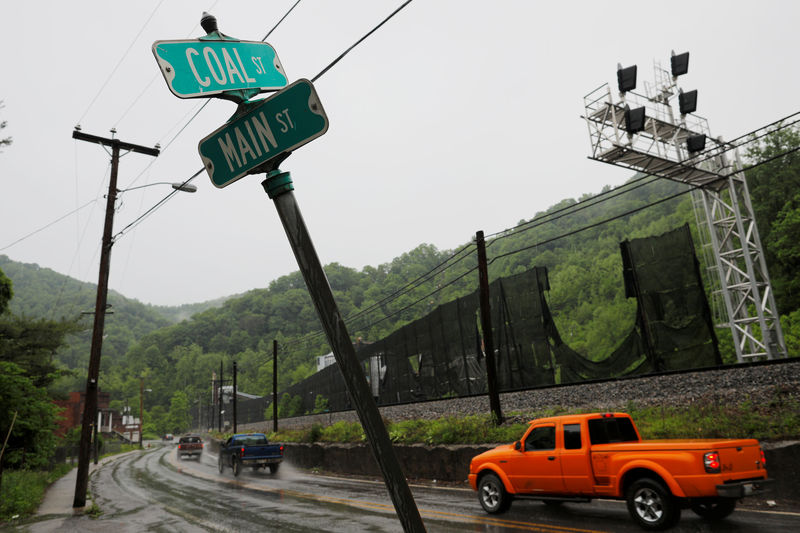 © Reuters. Cars pass the intersection of Coal Street and Main Street in Keystone, West Virginia, U.S., May 21, 2018.
© Reuters. Cars pass the intersection of Coal Street and Main Street in Keystone, West Virginia, U.S., May 21, 2018.By Valerie Volcovici
WASHINGTON (Reuters) – A federal fund to help U.S. coal miners disabled by black lung disease will require a multi-billion dollar taxpayer bailout if Congress doesn’t extend or increase the tax on coal production that funds it, according to a government report on Monday.
Coal companies are currently required to pay a $1.10 per ton tax on underground coal production to finance the federal Black Lung Disability Trust Fund, which pays medical and living expenses for eligible miners, but that amount is scheduled to revert back to the 1977 level of 50 cents.
“With the scheduled 2019 tax rate decrease, our moderate case simulation suggests that expected revenue will likely be insufficient to cover combined black lung benefit payments and administrative costs, as well as debt repayment expenditures,” according to the report from the non-partisan Government Accountability Office.
Cases of black lung, an incurable illness caused by inhaling coal dust, are rising to levels not seen in decades as miners plumb the depths of played out coal seams using heavy blasting equipment, according to government health officials.
The fund that helps them is already roughly $6 billion in debt, as revenues since it was created in the 1970s have failed to keep up with outflows. That debt could balloon to $15 billion by 2050 without Congressional action, the GAO report said.
The GAO offered three options to try to improve the solvency of the fund: extend the current excise tax rate to reduce the debt to $4.5 billion debt by 2050, increase the current tax rate by approximately 25 percent to eliminate the debt entirely by 2050, or allow the tax rate to sunset as scheduled, cancel the current debt, and appropriate $7.8 billion to the Fund.
That third option would amount to a multi-billion transfer of liability for black lung victims from coal companies to taxpayers.
The coal industry has been lobbying hard against the tax, arguing its payments have already been too high at a difficult time for mining companies and that the fund has been abused by undeserving applicants, such as smokers.
Ashley Burke, spokeswoman for the National Mining Association, rejected the idea the tax should be increased.
“There is no need for a tax increase on the coal industry. The only reason borrowing has been necessary is for the government to essentially repay itself for accumulated interest payments on legacy debt from the 70s and 80s,” she said.
A bipartisan effort by lawmakers to extend the current coal tax failed earlier this year after the coal industry lobbied Republican House leadership not to take it up.
Democratic Congressmen Bobby Scott of Virginia and Sander Levin of Michigan requested the GAO study in 2016 to clarify the fund’s financial condition.
Scott told Reuters the report should compel Congress to take action to extend or increase the coal excise tax.
“The existing black lung excise tax rate on coal companies is imperative to the long-term solvency of the trust fund,” Scott said in a statement.
The fund currently provides medical coverage and monthly payments for living expenses to more than 25,000 people.
Fusion Media or anyone involved with Fusion Media will not accept any liability for loss or damage as a result of reliance on the information including data, quotes, charts and buy/sell signals contained within this website. Please be fully informed regarding the risks and costs associated with trading the financial markets, it is one of the riskiest investment forms possible.
Source: Investing.com


























